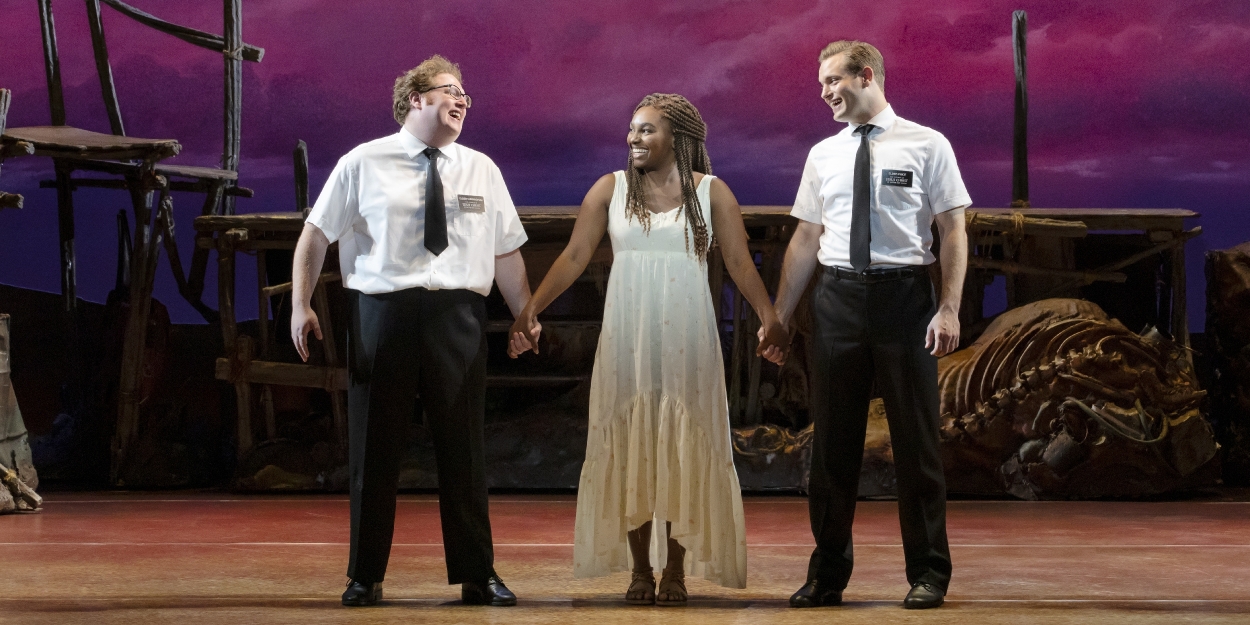Review: THE BOOK OF MORMON at the Aronoff Center
This widely anticipated national tour is currently playing in Cincinnati through February, 25th 2024.

Disclaimer: This review takes a negative stance of the Mormon church in its discussion of the show.
When The Book of Mormon first premiered on Broadway in 2011, it was a smash hit. South Park writers Trey Parker and Matt Stone, as well as Robert Lopez of Avenue Q acclaim (and later on, Disney movies Frozen and Coco) created this very original show using their methods of indiscriminate offensiveness to tell a story that mirrors some imperative issues in the Mormon society, such as the cult-like aspects with the church and its brainwashing tactics regarding recruitment and retainment, all while disguising them through an unserious tone.
Winning nine Tony Awards and breaking box office records, many applauded the show for embracing raunchiness and adult humor while poking fun at a religion that much of the general population has a personal distance from. Thirteen years later, the musical is still thriving on Broadway and beyond. The February 2024 Cincinnati, Ohio tour stop is all but sold out at this time, with extremely few seats still available for sale as this is being written. During the opening night on February 20th, audiences were lauding the funny shock value and the energetic performances.
Whether or not this is the first production someone has seen of The Book of Mormon, the talent holds up as the actors fully embrace their roles, while the remaining elements still perfectly fit the show's intent and tone as it spreads its messages all over the country.
If there is one word to describe the performers in this tour of The Book of Mormon, it would be "committed." The leading actors emphasize their character's quirks in effective ways, while the ensemble is absolutely dedicated in keeping the audience's attention. Sam McLellan and Sam Nackman, who play Elder Price and Elder Cunningham respectively, have a great dynamic working with each other.
McLellan tackles the complex neurosis of portraying a young man inflicted deeply by those influencing him throughout his life. He approaches his religion with blind acceptance and optimism because he was always told that if he did what he was told that he would be rewarded. Meanwhile, Nackman's physical comedy and speech delivery adds to his play on the anxiety and awkwardness of Elder Cunningham, giving secondhand embarrassment to those near him, particularly Elder Price, who was reluctantly matched with him as his mission brother.
Their relationship evolves however, and by the end they are able to genuinely connect and understand each other as they venture into a new and unexpected destiny. They also delve into the humanity of the characters, relieving themselves of a doing a forced characterization of members of the Mormon church. Because of this, their beliefs, perspectives, and situations have more weight to highlight the real absurdities of the missionary practice and the challenges its participants face, especially when dealing with internalized struggles of doubt and gaining a critical viewpoint of a huge part of their lives that has been so engrained in them to be infallible.
In considering each individual performance and the skills applied to their role, a major standout is Keke Nesbitt as Nabulungi. She has a way of illustrating her sweetness, and her gentle approach to her big solo "Sal Tlay Ka Siti" makes her even more endearing. In addition, she proves her range in the moments she does expand into a full sound at other points in the show, contributing a pure, jaw-dropping power in both group numbers and a heartbreaking reprise.
Another major recognition goes to the ensemble for their stamina in vocals and dance, especially in the big group performances where they all have to sync together through harmonies and fast-paced movements.
For the Mormon chorus, "Turn it Off" is a case where teamwork is key. The solos peppered within the song use peppy inflections to contrast the dark topics, and the supported vocalists work to make consistently beautiful sounds. Not only that, they continue on to build to a huge tap-dancing finale, complete with an on-stage quick change during a brief blackout to give a bonus flashy costume detail and heighten the experience even further. The Ugandan chorus also has moments of outstanding superiority.
(Major note: This show displays extremely negative stereotypes of the African community that should not be condoned. While the show makes fun of Mormons in a similar manner, there is a huge difference in exaggerating people who are in a natural place of power and privilege and dismissively depicting people who have for a long time been discriminated against in a structural and intentional manner that is still a sizeable social issue to this day. It is understood why the show takes this particular path as it integrates into the plot and ties in with the equal-opportunity degradation in a way that's not supposed to be taken seriously, but it doesn't mean it's appropriate. This does not detract in any way from the actors in these roles, who deserve to be respected in all conducts.)
Shortly after they are introduced, they go into the song "Hasa Diga Eebowai" to express the differences in difficulties and culture from their white "saviors" who are only there to press a highly questionable religion onto them.
Once again, they use stark irony by accompanying bright and happy music with the descriptions of local horrors and coping mechanisms in an explicit manner. This is also one of many instances within the musical that parodies other standards within the musical theatre canon. In this case, they make it rather clear that they're referencing "Hakuna Matata" from The Lion King while putting a cynical spin on it.
Other parallels include "Man Up" relating to "One Day More" from Les Misérables and "I Believe" having connections to "I Have Confidence" from The Sound of Music. Even though the writers of The Book of Mormon make a great departure from the typical nature of a standard Broadway musical, it is apparent they have a tremendous appreciation for the art form.
The Book of Mormon is currently presenting in Cincinnati, OH through February 25th, 2024 before continuing on its national tour. For tickets and more information about the tour, visit thebookofmormontour.com or click on the link below.
Photo credit: Julieta Cervantes
Comments
Videos
